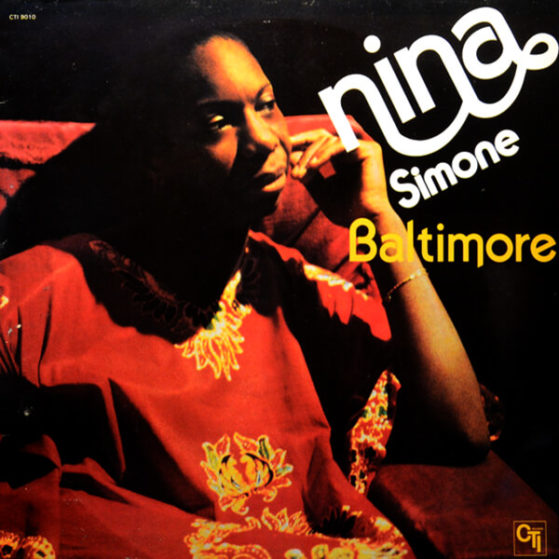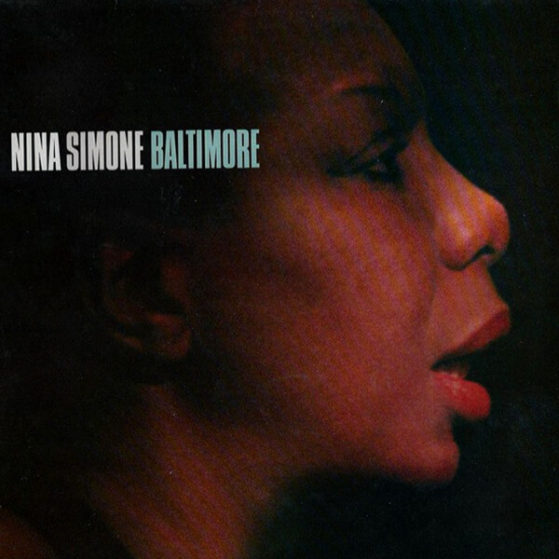BALTIMORE
She is rightfully considered one of music’s most original and compelling artistes, a past master at lyrical interpretation, a consummate, if oft-times eccentric performer who mesmerizes audiences with her hypnotic, spellbinding and clearly unique musical style. She has invested herself deeply and emotionally into practically every one of the over fifty albums she’s made and Baltimore, her now-classic 1978 one-off recording for CTI Records is a full and rich testimony to her distinctive artistry.
When Nina stepped into Studio Katy in Brussels, Belgium (one of her many ‘adopted’ homes) in January 1978, it was her first such excursion to make a full-out album in almost four years. The brilliant but often misunderstood performer who had earned herself the tag ‘The High Priestess of Soul’ had completed a prolific and productive seven-year association with RCA records in 1974. Her last recording for that label (It Is Finished, a fitting title for her swansong set for the company) had been somewhat uneven, containing a version of Ike & Tina Turner’s “Funkier Than A Mosquito’s Tweeter” alongside an old spiritual “Come By Here.”
In contrast, she appeared with a radiant smile on the front of Baltimore and for good reason: the album she had just recorded for CTI founder and producer Creed Taylor had captured Simone in good spirits, performing a selection of material carefully picked to express her musical authenticity.
It was at a concert at London’s Drury Lane Theatre in December 1977 that Creed Taylor approached the unpredictable performer about recording for CTI, a label that already boasted a strong roster that included the likes of Grover Washington Jr., Esther Phillips, Bob James, Patti Austin, and Hubert Laws. As Taylor indicates in his original notes, “I have recorded many diverse and talented personalities over the years, but I was not prepared for the ‘experience’ that was to follow in the recording studio [with Nina Simone]. When Nina walks into the studio, she radiates the most magnificent intensity of any artist I have ever seen.”
Nina performances on Baltimore are, in fact, among her best ever. Producer Taylor provided an array of top-notch musicians, including guitarists Jerry Friedman and Eric Gale, bassists Gary King and Will Lee, drummers Jim Madison and Andy Newmark, and percussionist Nick Marrero for the sessions, with Simone accompanying herself on keyboards on all but three tracks (longtime associate Al Schackman playing on the title cut and noted arranger David Matthews on “The Family” and “Forget”). Matthews’ awesome arrangements for the 18-piece string section (overdubbed in New York) serve as a perfect complement to Simone’s consistently-strong vocals. Likewise, a veritable choir of eight of New York’s top session singers (including Joshie Armstead, Debbie McDuffie, Maeretha Stewart, Frank Floyd, and Ray Simpson) offered the kind of vocal bedrock seldom heard on any of Simone’s previous recordings.
The material chosen for Baltimore fit hand-in-glove. Cut for cut, the album is outstanding. Her loping, reggae-influenced reading of the title track, Randy Newman’s wry commentary on a city that he implied lost its magic is superb. “Everything Must Change,” a Bernard Ighner-penned tue originally recorded for Quincy Jones’ 1974 Body Heat album is performed with the kind of experienced world-weariness that was frequently marked Simone’s work. “The Family,” previously recorded by country/pop artist Billy Joe Royal among others is given a quirky, upbeat R&B feel; while Hall & Oates’ chart-topping 1976 hit “Rich Girl,” again imbued with a strong hint of reggae, is given an infectious treatment that makes it a candidate as the album’s high-point. That same reggae backbeat is employed on “Forget,” a tune penned by David Matthews for the album.
More typical of Simone’s repertoire are tunes like “Music For Lovers,” which gives her the chance to demonstrate her virtuosity as a pianist and the more tender side of her personality. Likewise, “That’s All I Want From You” (originally recorded by Aretha Franklin for her Spirit In The Dark album in 1970) is a warm ballad given a heartfelt treatment by Simone, whose rendition of Judy Collins’ “My Father” is easily one of the album’s emotional standouts suggesting that lyric content was of particular significance for Simone (an assertion validated by her comments about her relationship with her father, detailed in her 1992 autobiography, I Put a Spell On You.)
Bringing Baltimore to an end are a pair of traditional gospel songs, the soothing “Balm In Gilead” and a rousing “If You Pray Right,” two tunes that pay tribute to Simone’s earliest roots as a church-going young musician in Tryon, North Carolina. In particular, “Pray Right” (the album’s final cut) finds Simone joyful and inspired while the background vocals provide just the right amount of fire and power as the track moves along with foot-tapping zeal.
Baltimore remains a landmark album in Nina Simone’s illustrious career.
Personnel
- Nina Simone: vocals, piano
- Eric Gale: guitar
- Gary King: bass
- Jim Madison: drums
- Nicky Marrero: percussion
- Al Schackman: piano (“Baltimore”)
- Jerry Friedman: guitar (“The Family” & “Rich Girl”)
- Will Lee: bass (“Rich Girl”)
- Andy Newmark: drums (“Rich Girl”)
- David Matthews: string arrangements, piano (“The Family” & “Forget”)
- Creed Taylor: producer
- David Palmer: engineer
- White Gate: photography
- Sib Chalawick: design
String section:
- Barry Finclair, Charles Libove, David Nadien, Harry Glickman, Harry Lookofsky, Herbert Sorkin, Marvin Morgenstern, Max Ellen, Richard Sortomme: violin
- Alfred Brown, Emanuel Vardi, LaMar Alsop: viola
- Alan Shulman, Charles McCracken, Jonathan Abramowitz: cello
- Chuck Israels, Homer Mensch, John Beal: double bass
Background vocals:
- Albertine Robinson, Babi Floyd, Debbie McDuffie, Frank Floyd, Joshie Armstead, Maeretha Stewart, Milt Grayson, Ray Simpson



